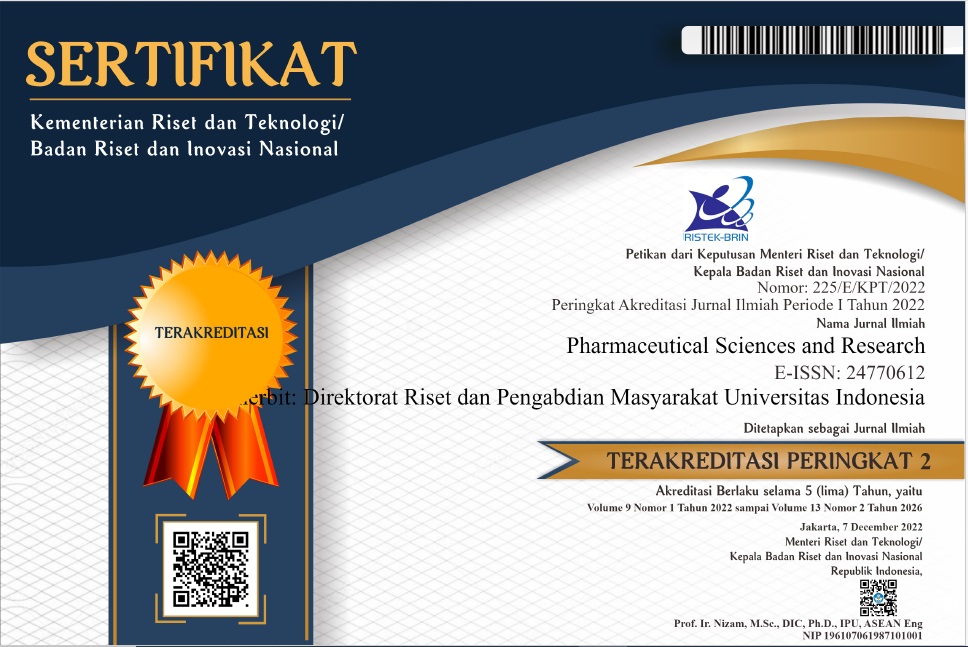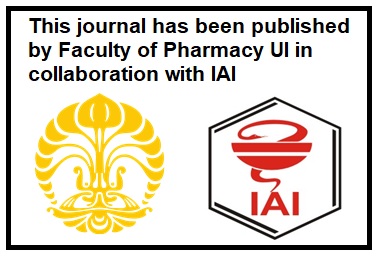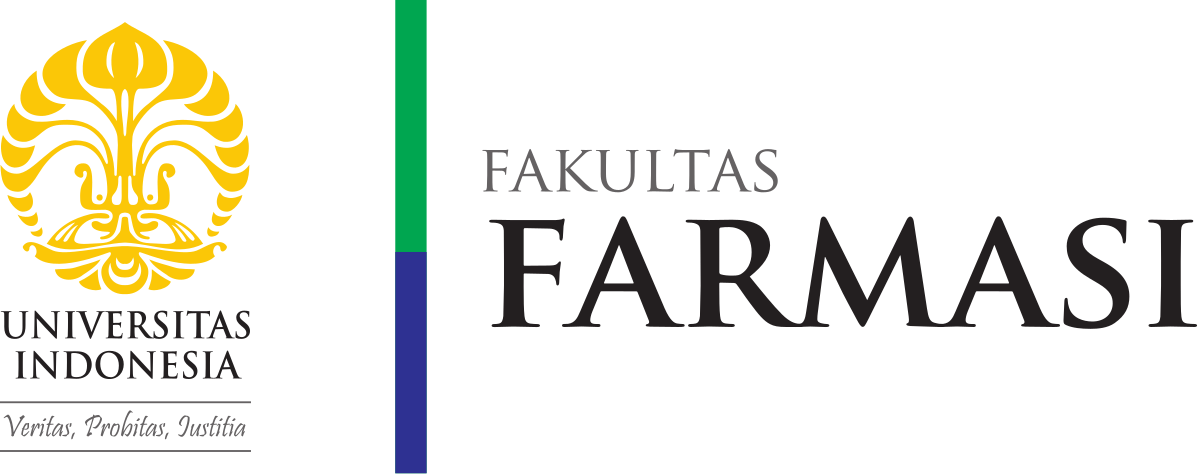Publication Ethics and Malpractice Statements
Contents
- Ethical Guidelines for Journal Publication
- Research Misconduct
- Complaints and Appeals
- Ethical Oversight
- Post-Publication Discussions and Corrections
- Duties of Editors
- Duties of Reviewers
- Duties of Authors
Pharmaceutical Science Research (PSR) is a peer-reviewed, open-access international journal that publishes original research, case reports, case series, review articles, and mini review articles.
This statement clarifies the ethical behaviour of all parties involved in the act of article publication in PSR, including the author(s), Editor in Chief, the Editorial Board, the Managing Editor, the peer-reviewer, and the publisher (Universitas Indonesia). This statement is based on the Committee on Publication Ethics (COPE)
Ethical Guidelines for Journal Publication
The publication of a peer-reviewed article in PSR is an essential building block in the development of a coherent and respected network of knowledge. It is a direct reflection of the quality of the work of the authors and the institutions that support them. Peer-reviewed articles support and embody the scientific method. It is therefore important to agree upon standards of expected ethical behaviour for all parties involved in the act of publishing: the author, the journal editor, the peer reviewer, the publisher, and the society.
As a member of COPE and the publisher of PSR, Universitas Indonesia takes its duties of guardianship over all stages of publishing seriously and recognises the ethical behaviour and other responsibilities. Universitas Indonesia and the PSR Editorial Board are committed to ensuring that advertising, reprint, or any other commercial revenue has no impact or influence on editorial decisions. In addition, Universitas Indonesia and the PSR Editorial Board will assist in communications with other journals and/or publishers where this is useful and necessary.
Research Misconduct
In cases of suspected misconduct and to convey the misconduct fairly, the Editor in Chief, the Editorial Board, and the Managing Editor will refer to The Committee on Publication Ethics (COPE) Best Practice Guidelines. The editors will duly investigate an allegation. If research misconduct is found to have been committed, a submitted manuscript will be rejected and a published paper will be amended as appropriate, to include correction, retraction or expression of concern, as appropriate.
Different approaches will be taken based on the type of research misconduct. The first process involves determining the type of misconduct allegation and conducting an assessment using the publication ethics audit tool. Based on the result of the audit, the editors will develop resources to address the case.
Complaints and Appeals
PSR has clear procedures for handling complaints against the Journal Editorial Team or Publisher. The complaint will be clarified to a respected person regarding the complaint case. The scope of the complaint covers everything related to the journal's business processes, for example, the editorial process, alleged manipulation of citation, unfair editors/reviewers, manipulation of peer-review, etc. Complaint cases will be processed according to COPE guidelines. Complaint cases can be sent via email to: psr@farmasi.ui.ac.id.
Ethical Oversight
When reporting a study that involved human participants, their data, or biological material, authors should include a statement including the name of the ethical authority and the consent number, that confirms that the study was approved by the appropriate institutional and/or national research ethics committee. If a study was granted an exemption from requiring ethics approval, this should also be detailed in the manuscript (including the reasons for the exemption).
Research involving experimental animals be carried out following animal ethics and welfare. Experimental animals must be appropriately treated minimizing the pain that might arise during the treatment. The authors must make a statement, including the name of the ethical authority and the consent number; the trial is carried out in compliance with animal ethics and welfare.
Editors reserve the right to reject papers if there is doubt as to whether appropriate procedures have been used.
Post-Publication Discussions and Corrections
PSR accepts discussion and corrections on published articles by readers. In case the reader gives discussions and corrections toward a published article, the reader can contact by email to Editor in Chief by explaining the discussions and corrections. If accepted (by Editor in Chief), the discussions and corrections will be published in the next issue as a Letter to Editor. Respected Authors can reply/answer the discussions and corrections from the reader by sending the reply to Editor in Chief. Therefore, Editors may publish the answer as a Reply to Letter to Editor.
Duties of Editors
- The Decision for Publication. The editors are responsible for deciding which of the articles submitted to PSR should be published. The manuscript will be evaluated based on its appropriateness for PSR, contribution to the discipline, cogency of analysis, conceptual breadth, clarity of presentation, and technical adequacy. The editors may be guided by the policies of the journal’s Editorial Board and constrained by such legal requirements as shall then be in force regarding libel, copyright infringement, and plagiarism. The editors may communicate with other editors or reviewers in making the final decision.
- Fair Play. An editor, at any time, evaluates manuscripts for their intellectual content, without regard to the race, gender, sexual orientation, religious beliefs, ethnic origin, citizenship, political philosophy, or institutional affiliation of the authors. Manuscripts submitted by members of the journal's Editorial Board are subjected to the same evaluation procedure.
- Confidentiality. The editors and any editorial staff must treat all submitted papers as confidential, and not disclose any information about a submitted manuscript to anyone other than the corresponding author, reviewers, potential reviewers, other editorial advisers, and the publisher, as appropriate.
- Review of Manuscripts. Each manuscript should be peer-reviewed before publication, taking into full account possible bias due to related or conflicting interests. Each manuscript must be initially evaluated for originality. PSR uses iThenticate and Turnitin to detect potential plagiarism in the manuscript. Editors should organise and use peer reviews fairly and wisely, explain their peer-review processes in the information provided to authors, and indicate which parts of the journal are peer-reviewed. Editors should use appropriate peer reviewers for papers that are considered for publication by selecting individuals with sufficient expertise and avoiding those with conflicts of interest.
- Disclosure and Conflicts of Interest. Unpublished materials disclosed in a submitted manuscript must not be used by anyone who has a view of the manuscript (while handling it) in his or her own research without the express written consent of the author.
Duties of Reviewers
- Contribution to Editorial Decisions. Reviewers assist editors in making editorial decisions and may assist the authors in improving their manuscripts through editorial communications with them.
- Promptness. Any invited or selected reviewer who feels unqualified to review the research reported in a manuscript or knows that its prompt review will be impossible should immediately notify the editors to be excused from the review process and allow alternative reviewers to be contacted.
- Confidentiality. Any manuscripts received for review are confidential and must be treated as confidential documents. They must not be shown to or discussed with others except as authorised by the editor.
- Standards of Objectivity. The review process should be conducted objectively and expressed clearly with supporting arguments so that authors can use it to improve the manuscript. Personal criticism of the authors is inappropriate.
- Timeliness. Reviewers are requested to complete a review process in a timely manner. If it is not possible to meet the deadline or complete the review process, the reviewers should promptly notify the editors.
- Acknowledgement of Sources. The reviewers should identify relevant published works that have not been cited by the authors. Any statement about an observation, derivation, or argument that has been reported in a previous publication should be accompanied by the relevant citation. Reviewers should notify the editors of any substantial similarity or overlap with any other published paper of which they have personal knowledge.
- Disclosure and Conflict of Interest. No reviewer should have any conflict of interest. Reviewers should not consider manuscripts where they have a conflict of interest resulting from competitive, collaborative, or other relationships or connections with any of the authors, companies, or institutions connected to the manuscript. Unpublished material disclosed in a submitted manuscript must not be used in a reviewer’s own research without the written consent of the authors. Privileged information or ideas obtained through peer review must remain confidential and not be used for personal advantage.
Duties of Authors
- Reporting Standards. The authors of original research reports should present an accurate account of the work performed as well as an objective discussion of its significance. Underlying data should be represented accurately in the paper. A paper should contain sufficient detail and references to enable others to replicate the work. Fraudulent or knowingly inaccurate statements constitute unethical behaviour and are unacceptable.
- Data Access, Retention, and Reproducibility. Authors are asked to provide the raw data in connection with their paper for editorial review, and should be prepared to provide public access to such data, if practicable, and should, in any event, be prepared to retain such data for a reasonable time after publication. The authors are responsible for data reproducibility.
- Originality and Plagiarism. Authors should strive to describe their methods clearly and unambiguously so that others can confirm their findings. Authors should present their results clearly, honestly, and without fabrication, falsification, or inappropriate data manipulation. The authors should ensure that they have written entirely original works, and if they have used the work and/or words of others, ensure that this has been appropriately cited or quoted.
- Multiple, Redundant, or Concurrent Publication. An author should not, in general, publish manuscripts describing essentially the same research in more than one journal or primary publication. Submitting the same manuscript to more than one journal concurrently constitutes unethical publishing behaviour and is unacceptable.
- Acknowledgement of Sources. Proper acknowledgement of the work of others must always be given. Authors should cite publications that have been influential in determining the nature of the reported work.
- Authorship and Contributorship of the Article
- All authors must have significantly contributed to the research. Contributors who have made less substantial contributions to the research or the publication can be acknowledged, but they should not be identified as authors.
- The corresponding author should ensure that all appropriate co-authors and no inappropriate co-authors are listed in the paper and that all co-authors have seen and approved the final version of the paper and have agreed to its submission for publication.
- Disclosure and Conflicts of Interest. Authors must tell the journal when they have a direct or indirect conflict of interest with editors or members of the Editorial Board or international scientific committee. All authors must submit a list of references and financial support if so requested by the Editorial Board. All sources of research funding, including direct and indirect financial support, should be disclosed.
- Fundamental Errors in Published Work. If an author discovers a significant error or inaccuracy in his/her own published work, he/she must promptly notify the journal editor or publisher and cooperate with the editor to retract or correct the paper.








